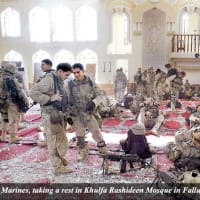| Text of Muslim clerics’ letter to the Pope | |
| 10/19/2006 8:00:00 PM GMT | |
The text was posted on The Independent Catholic News’ website. In the Name of God, the Compassionate, the Merciful, And may Peace and Blessings be upon the Prophet Muhammad (PBUH) OPEN LETTER TO HIS HOLINESS POPE BENEDICT XVI In the Name of God, the Compassionate, the Merciful, "Do not contend with people of the Book except in the fairest way." (The Holy Qur'an, al-Ankabut, 29:4) Your Holiness, With regards to your lecture at the University of Regensburg in Germany on September 12th 2006, we thought it appropriate, in the spirit of open exchange, to address your use of a debate between the Emperor Manuel II Paleologus and a "learned Persian" as the starting point for a discourse on the relationship between reason and faith. While we applaud your efforts to oppose the dominance of posi-tivism and materialism in human life, we must point out some errors in the way you mentioned Islam as a counterpoint to the proper use of reason, as well as some mistakes in the assertions you put forward in support of your argument. There is no Compulsion in Religion: You mention that "according to the experts" the verse which begins, There is no compulsion in religion (al-Baqarah 2:256) is from the early period when the Prophet (PBUH) "was still powerless and under threat," but this is incorrect. In fact this verse is acknowledged to belong to the period of Qur’anic revelation corresponding to the political and military ascendance of the young Muslim community. ”There is no compulsion in religion” was not a command to Muslims to remain steadfast in the face of the desire of their oppressors to force them to renounce their faith, but was a reminder to Muslims themselves, once they had attained power, that they could not force another's heart to believe. “There is no compulsion in religion” addresses those in a position of strength, not weakness. The earliest commen-taries on the Qur'an (such as that of Al-Tabari) make it clear that some Muslims of Medina wanted to force their children to convert from Judaism or Christianity to Islam, and this verse was precisely an answer to them not to try to force their children to convert to Islam. Moreover, Muslims are also guided by such verses as Say: “The truth is from your Lord; so whosoever will, let him believe, and whosoever will, let him disbelieve.” (al-Kahf 18:29); and Say: “O disbelievers! I worship not that which ye worship; Nor worship ye that which I worship. And I shall not worship that which ye worship. Nor will ye worship that which I worship. Unto you your religion, and unto me my religion.” (al-Kafirun: 109:1-6). God's Transcendence You also say that "for Muslim teaching, God is absolutely trans-cendent," a simplification which can be misleading. The Qur’an states; “There is no thing like unto Him” (al-Shura 42:11), but it also states, “He is the Light of the heavens and the earth” (al-Nur 24:35); and, “We are closer to him than his jugular vein” (Qaf 50:16); and, “He is the First, the Last, the Inward, and the Outward (al-Hadid 57:3)”; and, “He is with you wherever you are” (al-Hadid 57:4); and, “Where-soever you turn, there is the Face of God” (al-Baqarah 2:115). Also, let us recall the saying of the Prophet (PBUH), which states that God says, "When I love him (the worship-per), I am the hearing by which he hears, the sight by which he sees, the hand with which he grasps, and the foot with which he walks." (Sahih al-Bukhari no 6502, Kitab al-Riqaq) In the Islamic spiritual, theolo-gical, and philosophical tradi-tion, the thinker you mention, Ibn Hazm (d. 1069 CE), is a worthy but very marginal figure, who belonged to the Zahiri school of jurisprudence which is followed by no one in the Islamic world today. If one is looking for classical formula-tions of the doctrine of transcendence, much more important to Muslims are figures such as al-Ghazali (d. 1111 CE) and many others who are far more influential and more represent-ative of Islamic belief than Ibn Hazm The Use of Reason: The Islamic tradition is rich in its explorations of the nature of human intelligence and its relation to God's Nature and His Will, including questions of what is self-evident and what is not. However, the dicho-tomy between "reason" on one hand and "faith" on the other does not exist in precisely the same form in Islamic thought. Rather, Muslims have come to terms with the power and limits of human intelligence in their own way, acknowledging a hierarchy of knowledge of which reason is a crucial part. There are two extremes which the Islamic intel-lectual tradition has generally managed to avoid: one is to make the analytical mind the ultimate arbiter of truth, and the other is to deny the power of human under-standing to address ultimate questions. More importantly, in their most mature and mainstream forms the intellectual explorations of Muslims through the ages have maintained a consonance between the truths of the Qur’anic revel-ation and the demands of human intelligence, without sacrificing one for the other. God says, “We shall show them Our signs in the horizons and in themselves until it is clear to them that it is the truth” (Fussilat 41:53). Reason itself is one among the many signs within us, which God invites us to contemplate, and to contemplate with, as a way of knowing the truth. |
We would like to point out that "holy war" is a term that does not exist in Islamic languages. Jihad, it must be emphasized, means struggle, and specifically struggle in the way of God. This struggle may take many forms, including the use of force. Though a jihad may be sacred in the sense of being directed towards a sacred ideal, it is not necessarily a "war".
The authoritative and traditional Islamic rules of war can be summarized in the following principles:
1. Non-combatants are not permitted or legitimate targets. This was emphasized explicitly time and again by the Prophet (PBUH), his Companions, and by the learned tradition since then.
2. Religious belief alone does not make anyone the object of attack. The original Muslim community was fighting against pagans who had also expelled them from their homes, perse-cuted, tortured, and murdered them. Thereafter, the Islamic conquests were political in nature.
3. Muslims can and should live peacefully with their neighbours. “And if they incline to peace, do thou incline to it; and put thy trust in God” (al-Anfal 8:61). However, this does not exclude legitimate self-defence and maintenance of sovereignty.
Muslims are just as bound to obey these rules as they are to refrain from theft and adultery. If a religion regulates war and describes circumstances where it is necessary and just, that does not make that religion war-like, anymore than regulating sexuality makes a religion prurient. If some have disregarded a long and well-established tradition in favour of utopian dreams where the end justifies the means, they have done so of their own accord and without the sanction of God, His Prophet (PBUH), or the learned tradition. God says in the Holy Qur'an: “Let not hatred of any people seduce you into being unjust. Be just, that is nearer to piety” (al-Ma'idah _5:_8). In this context we must state that the murder on September 17th of an innocent Catholic nun in Somalia-and any other similar acts of wanton individual violence-'in reaction to' your lecture at the University of Regensburg, is completely un-Islamic, and we totally condemn such acts.
Forced Conversion
The notion that Muslims are commanded to spread their faith "by the sword" or that Islam in fact was largely spread "by the sword" does not hold up to scrutiny. Indeed, as a political entity Islam spread partly as a result of conquest, but the greater part of its expansion came as a result of preaching and mission-ary activity. Islamic teaching did not prescribe that the conquered populations be forced or coerced into converting. Indeed, many of the first areas conquered by the Muslims remained predominantly non-Muslim for centuries. Had Muslims desired to convert all others by force, there would not be a single church or synagogue left anywhere in the Islamic world. The command There is no compulsion in religion means now what it meant then...
As with the rules of war, history shows that some Muslims have violated Islamic tenets concerning forced conversion and the treatment of other religious communities, but history also shows that these are by far the exception which proves the rule. We emphatically agree that forcing others to believe-if such a thing be truly possible at all-is not pleasing to God and that God is not pleased by blood. Indeed, we believe, and Muslims have always believed, that “Whoso slays a soul not to retaliate for a soul slain, nor for corruption done in the land, it shall be as if he had slain mankind altogether.” (al-Ma'idah _5:32__).




















※コメント投稿者のブログIDはブログ作成者のみに通知されます